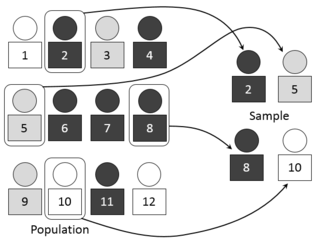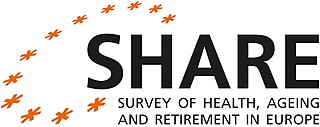
In statistics, quality assurance, and survey methodology, sampling is the selection of a subset or a statistical sample of individuals from within a statistical population to estimate characteristics of the whole population. Statisticians attempt to collect samples that are representative of the population. Sampling has lower costs and faster data collection compared to recording data from the entire population, and thus, it can provide insights in cases where it is infeasible to measure an entire population.

Qualitative research is a type of research that aims to gather and analyse non-numerical (descriptive) data in order to gain an understanding of individuals' social reality, including understanding their attitudes, beliefs, and motivation. This type of research typically involves in-depth interviews, focus groups, or observations in order to collect data that is rich in detail and context. Qualitative research is often used to explore complex phenomena or to gain insight into people's experiences and perspectives on a particular topic. It is particularly useful when researchers want to understand the meaning that people attach to their experiences or when they want to uncover the underlying reasons for people's behavior. Qualitative methods include ethnography, grounded theory, discourse analysis, and interpretative phenomenological analysis. Qualitative research methods have been used in sociology, anthropology, political science, psychology, communication studies, social work, folklore, educational research, information science and software engineering research.
A cohort study is a particular form of longitudinal study that samples a cohort, performing a cross-section at intervals through time. It is a type of panel study where the individuals in the panel share a common characteristic.

The Survey of Income and Program Participation (SIPP) is a statistical survey conducted by the U.S. Census Bureau. The SIPP is designed to provide accurate and comprehensive information about the incomes of American individuals and households and their participation in income transfer programs.

The British Household Panel Survey (BHPS), carried out at the Institute for Social and Economic Research of the University of Essex, is a survey for social and economic research. A sample of British households was drawn and first interviewed in 1991. The members of these original households have since been followed and annually interviewed. The resulting data base is very popular among social scientists for quantitative analyses of social and economic change. One of the most important precursors of the BHPS is the Panel Study of Income Dynamics (PSID), established in the 1960s at the University of Michigan, Ann Arbor (US). The initial BHPS sample consisted of 10,300 individuals across Great Britain. Additional samples were recruited in Scotland and Wales in 1999 and the study was extended to Northern Ireland in 2001.
The General Social Survey (GSS) is a sociological survey created in 1972 by the National Opinion Research Center (NORC) at the University of Chicago and funded by the National Science Foundation. The GSS collects information biannually and keeps a historical record of the concerns, experiences, attitudes, and practices of residents of the United States.

Field research, field studies, or fieldwork is the collection of raw data outside a laboratory, library, or workplace setting. The approaches and methods used in field research vary across disciplines. For example, biologists who conduct field research may simply observe animals interacting with their environments, whereas social scientists conducting field research may interview or observe people in their natural environments to learn their languages, folklore, and social structures.
The GermanSocio-Economic Panel is a longitudinal panel dataset of the population in Germany. It is a household based study which started in 1984 and which reinterviews adult household members annually. Additional samples have been taken from time to time. In 2015, there will be about 14,000 households, and more than 30,000 adult persons sampled. Some of the many topics surveyed include household composition, occupation, employment, earnings, health and life satisfaction. The annual surveys are conducted by the German Institute for Economic Research and the Kantar Group. The survey is funded by the German Federal Government and the State of Berlin via the «Bund-Länder-Kommission» for Educational Planning and Research Promotion.
The Cross-National Equivalent File(CNEF) contains data from general population household-based panel surveys fielded in Australia, Canada, Germany, Great Britain, Japan, Korea, Russia, Switzerland and the United States. Each of these countries fields a longitudinal survey of households and their inhabitants. All of the surveys follow the set of people living in the set of households surveyed initially. With the exception of the Japan Household Panel Study, all of the surveys also follow the members of the original households, labeled as "original sample members" when they move away and form new households. Almost all of the surveys also follow people who joined a household of an "original sample member". Researchers at institutions in each country collaborate with CNEF to harmonize a subset of the data from each survey. The harmonized data get used, individually or as a set, by researchers who compare social and economic outcomes over time and across countries. Researchers exploit a cross-national design to understand whether differences in observed outcomes can be explained by differences in policies, social, and economic situations one observes across countries. The CNEF is managed by Dean Lillard and Temur Akhmedov at the Department of Human Sciences at The Ohio State University (US).

The Survey of Health, Ageing and Retirement in Europe (SHARE) is a multidisciplinary and cross-national panel database of micro data on health, socio-economic status and social and family networks. In seven survey waves to date, SHARE has conducted approximately 380,000 interviews with about 140,000 individuals aged 50 and over. The survey covers 28 European countries and Israel.
The English Longitudinal Study of Ageing (ELSA) is a longitudinal study that collects multidisciplinary data from a representative sample of the English population aged 50 and older to look at all aspects of aging in England.

In research of human subjects, a survey is a list of questions aimed for extracting specific data from a particular group of people. Surveys may be conducted by phone, mail, via the internet, and also at street corners or in malls. Surveys are used to gather or gain knowledge in fields such as social research and demography.

China Family Panel Studies is a nationally representative, biennial longitudinal general social survey project designed to document changes in Chinese society, economy, population, education, and health. The CFPS was launched in 2010 by the Institute of Social Science Survey (ISSS) of Peking University, China. The data were collected at the individual, family, and community levels and are targeted for use in academic research and public policy analysis. CFPS focuses on the economic and non-economic well-being of the Chinese people, and covers topics such as economic activities, educational attainment, family relationships and dynamics, migration, and physical and mental health. The themes cover social, economic, education, health and so forth.
The Panel Study of Income Dynamics (PSID) is a longitudinal panel survey of American families, conducted by the Survey Research Center at the University of Michigan.
The Economic and Social Data Service (ESDS) is a national data archiving and dissemination service that was founded in January 2003. It is funded jointly by the Economic and Social Research Council (ESRC) and Jisc. In July 2012, the ESRC announced it will become a partner in the UK Data Service, to be established as of October 1st of 2012.
The Longitudinal Study of Young People in England (LSYPE), also known as "Next Steps", is a large-scale panel study collecting information about the young people of England, aged 13 to 14 in 2004.
The Mexican Health and Aging Study (MHAS), also known by its Spanish name, Estudio Nacional de Salud y Envejecimiento en México, ENASEM, is the first panel study of health and aging in Mexico. The first phase of MHAS was supported by a grant from the MHAS was supported by a grant from the National Institutes of Health/National Institute on Aging. The study was a collaborative effort among researchers from the Universities of Pennsylvania, Maryland, and Wisconsin in the U.S., and the Instituto Nacional de Estadística, Geografia e Informática.
TARKI Social Research Institute is an independent research centre located in Budapest, Hungary. TARKI conducts applied socioeconomic research in social stratification, labour markets, income distribution, intergenerational transfers, tax-benefit systems, consumption and lifestyle patterns and attitudes in Hungary and, in the majority of its projects, in Europe. TARKI is closely embedded in international collaborations with major European academic partners in various research projects. Senior staff at TARKI all have PhDs with substantive and methodological interests and many hold professorial appointments at major universities. TARKI has its own fieldwork apparatus, capable of carrying out regular empirical surveys on social structure and on attitudes and of managing large scale international research. TARKI also carries out the Hungarian fieldwork of various high-quality international surveys.
The Future of Families and Child Wellbeing Study (FFCWS) is a longitudinal birth cohort study of American families. Formerly known as the Fragile Families and Child Wellbeing Study, the study’s name was changed in January 2023.
The Household, Income and Labour Dynamics in Australia (HILDA) survey is an Australian household-based panel study which began in 2001. It has been used for examining issues such as the incidence of persistent poverty; assets and income in the transition to retirement; the correlates and impact of changes in physical and mental health; and an international comparison of wealth and happiness. The survey is widely used by Australian and international researchers in the fields of economics, social science and social policy and by the Australian Government. The HILDA survey is managed by a small team from the Melbourne Institute of Applied Economic and Social Research at the University of Melbourne and the national fieldwork is carried out by ACNielsen and Roy Morgan Research. The survey is funded by the Australian Government through the Department of Social Services.






